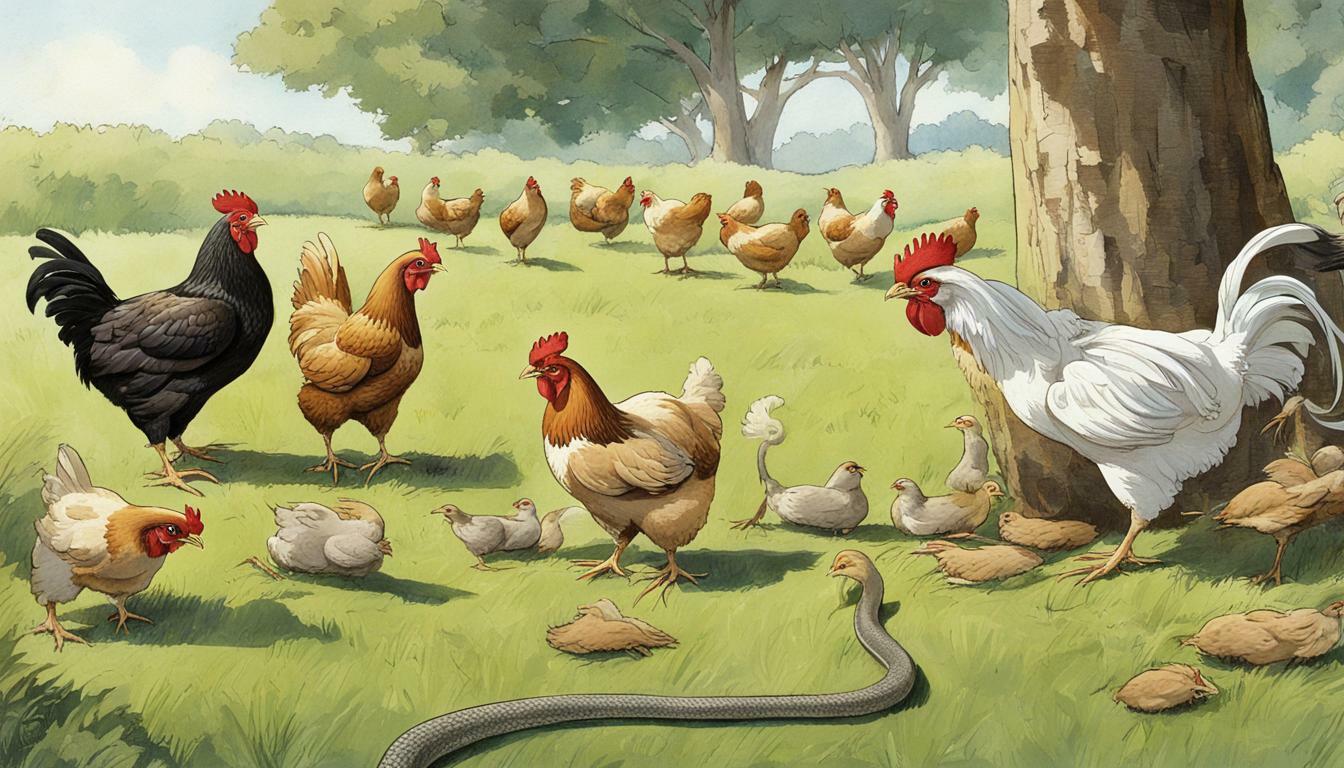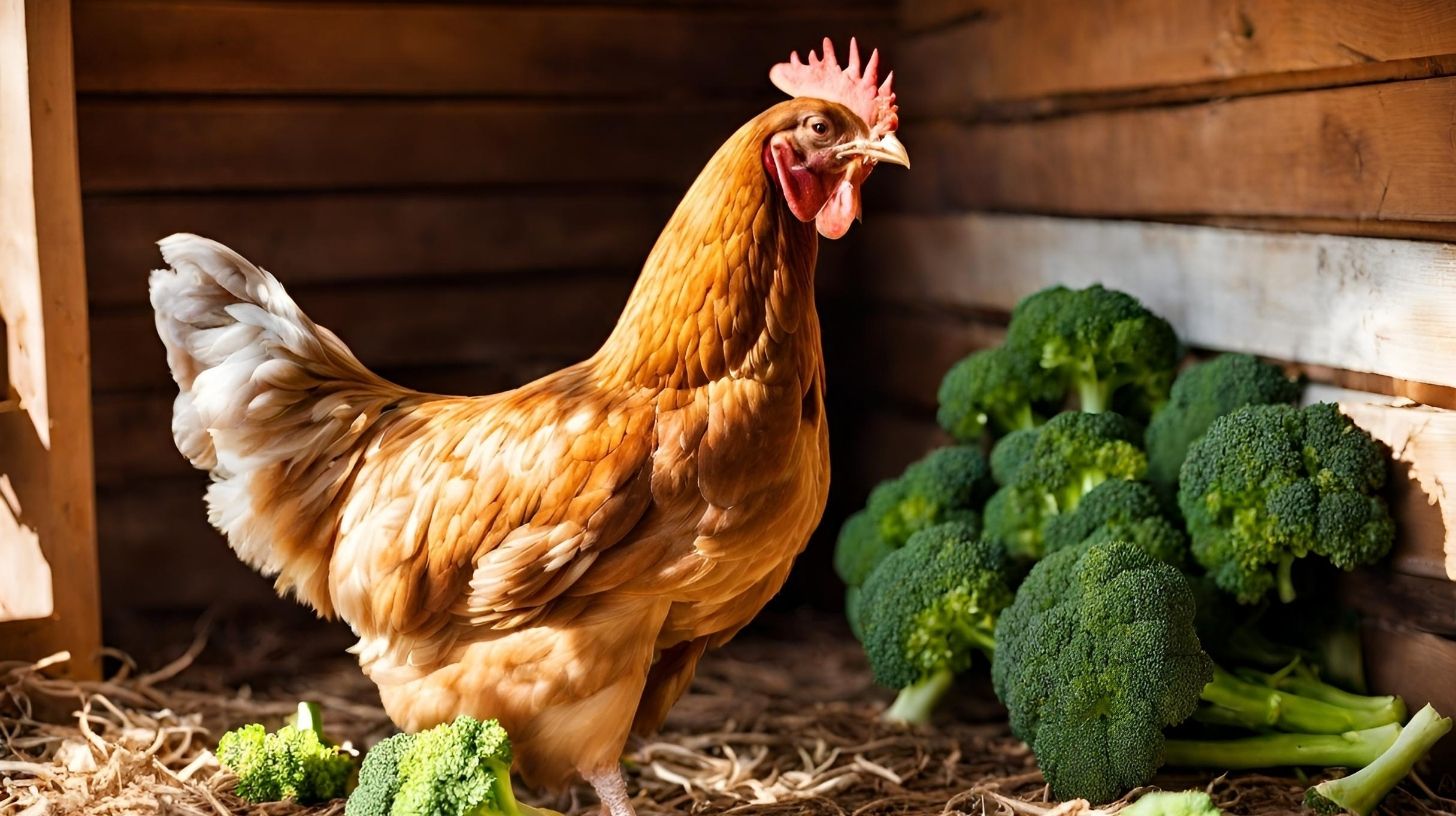Do Chickens Eat Snakes? Unraveling the Mystery!

Table of content:
- Why Do Chickens Eat Snakes?
- What Kind of Snakes Do Chickens Eat?
- Do Chickens Eat Small Snakes?
- What Kind of Snakes Do Chickens Eat?
- Will Chickens Eat Poisonous Snakes?
- Do Chickens Kill Snakes?
- Do Roosters Eat Snakes?
- How Do Chickens Catch and Eat Snakes?
- Are Chickens Immune to Snake Venom?
- Are Snakes a Big Threat to Chickens?
- Are Wild Snakes a Problem for Free-Range Chickens?
- How to Keep Snakes Away from Chickens
- Final Thoughts
Chickens eating snakes may seem like an unusual occurrence, but it’s actually quite common in backyard flocks. As opportunistic omnivores, chickens will eat just about anything they can get their beaks on, including small snakes. Many chicken owners have witnessed their hens ruthlessly attacking and consuming serpents that dare to enter the coop or henhouse.
But why do chickens eat snakes? And what kind of snakes do they eat? Keep reading to find out the answers.
Why Do Chickens Eat Snakes?
Chickens are natural foragers with a flexible, omnivorous diet. They will eat plants, seeds, insects, worms, small vertebrates and even meat if given the opportunity. So foraging chickens that come across a snake see it simply as prey.
Another factor is that chickens have a strong prey drive. As descendants of jungle fowl, chickens retain those natural hunting instincts. A live wriggling snake triggers their urge to chase, kill and eat.
Many people are surprised to witness just how aggressive and skilled chickens are at dispatching serpents. But it makes sense considering snakes are a common predator chickens deal with in the wild. Chickens likely developed this aggression towards snakes as an adaptive defense mechanism.
What Kind of Snakes Do Chickens Eat?
Chickens will readily eat any small snake they can overpower. This includes:
Small, Non-Venomous Snakes
Garter snakes, rat snakes, racers, gopher snakes, etc. Pretty much any small, non-venomous snake is on the menu for chickens. They will kill and consume snakes up to about one-quarter their size.
Baby Venomous Snakes
Young rattlesnakes, copperheads and other venomous snakes are not safe from foraging chickens. Chickens will eat juvenile venomous snakes before they grow large enough to be a danger.
Injured or Already Dead Snakes
Don’t be surprised to see your flock munching on a lifeless serpent. Chickens are opportunistic eaters and won’t hesitate to eat snakes that are already dead or injured. This includes venomous snakes.
So while chickens will eat just about any small snake, they do tend to avoid larger, adult venomous snakes that pose a real threat. The snake species chickens eat depends largely on the local ecosystem. Backyard chickens in rattlesnake country eat a lot of young rattlers. Chickens in the southeastern U.S. regularly snack on small copperheads and cottonmouths.
Do Chickens Eat Small Snakes?
Yes, chickens happily eat small snakes whenever they can catch them. In fact, smaller garter snakes and grass snakes often end up as chicken feed.
Young snakes are naive and clumsy hunters. They also tend to seek out sheltered spots like barns and compost heaps. This brings them into constant contact with opportunistic chickens. The chickens make short work of dispatching and eating any tiny serpents they find hiding in their domain.
Even at a few months old, chickens are adept at catching and subduing small snakes. The hens will seize snakes by the head and vigorously shake them to break their necks. Roosters may hold the snake in place with their claws while pecking its head. The chicken will then swallow the snake whole or tear it apart and eat the pieces.
So while baby snakes might seem like easy pickings, they rarely stand a chance against a chicken. Chickens will consume small, non-venomous snakes up to around 6 inches in length.
What Kind of Snakes Do Chickens Eat?
Chickens are not picky eaters and will eat all kinds of small snakes that cross their path, both venomous and non-venomous. Here are some of the most common snake species chickens prey on:
Garter Snakes
Garter snakes are one of the most common snakes chickens eat. Widespread across North America, these small snakes often find their way into chicken coops looking for eggs or young chicks. But they end up being eaten themselves instead.
Rat Snakes
Another very common chicken snack is rat snakes. Known for being excellent climbers, rat snakes often end up in nest boxes seeking eggs. Aggressive hens will attack and consume any rat snake that dares enter their coop.
Copperheads
Young copperheads are frequent targets for foraging chickens in the southern U.S. Capable of eating snakes up to one-quarter their size, mature hens make short work of dispatching small copperheads.
Rattlesnakes
In rattlesnake country, chickens eat more baby rattlesnakes than just about any other snake. The venom doesn’t seem to deter chickens from eating them. They’ll readily consume any young rattler under 10 inches or so.
Grass Snakes
Slender grass snakes are a common snack for chickens across Europe, Asia and North Africa. These thin snakes are the perfect size for chickens to overpower and swallow whole.
Chicken Snakes
Despite the name, chicken snakes themselves often end up as prey for chickens. Roosters in particular seem to relish attacking and eating these opportunistic egg eaters whenever they can.
Ringneck Snakes
The small, shy ringneck snake is yet another harmless serpent chickens love to gobble up. These docile snakes rarely bite in defense, making them easy pickings.
So just about any small snake is fair game for a hungry chicken. The most important factor is the snake being small enough for the chicken to easily overpower and consume.
Will Chickens Eat Poisonous Snakes?
Many people wonder if chickens will eat venomous snakes and if so, does the venom harm the chicken? The short answer is yes, chickens will readily eat venomous snakes with seemingly no ill effects from the venom.
Chickens have a surprisingly high resistance to snake venom. Their bodies seem adept at digesting snake venom, possibly due to evolutionary adaptations. While the venom may irritate their digestive tract a bit, it rarely does any serious harm. The thick tissue and protective layers in a chicken’s throat and stomach help neutralize the venom as they swallow the snake.
Of course, this venom resistance only applies if the chicken eats the snake. A venomous snake bite injecting fresh venom directly into the chicken’s bloodstream is another story. But chickens are careful not to get bitten in the first place.
When attacking a venomous snake, chickens will immediately go for decapitation. They avoid grabbing the snake’s midsection to prevent being bitten. If successful, the chicken can then safely swallow the severed snake head first to avoid contact with the fangs. It’s gruesome but effective!
So while chicken owners should still keep venomous snakes far away from their flock, they generally don’t have to worry about the chickens eating small ones they find on their own. The chickens seem capable of consuming tiny vipers without issue. Just don’t expect them to survive an actual snakebite.
Do Chickens Kill Snakes?
It’s not just about eating snakes – chickens actively kill them too. In fact, maiming and killing snakes seems ingrained in chickens’ instincts, even if they don’t eat the snake afterward.
You’ll often see a flock of chickens mob, attack and brutalize snakes that get into their territory. They will peck, claw and trample the snake long after it’s clearly dead. This mobbing behavior suggests chickens view snakes as a serious threat to eliminate, not just a food source.
Roosters in particular are aggressive snake-killers. They will attack and spur snakes relentlessly while their hens hang back. The rooster often delivers the killing blow by grasping the snake’s head in their beak and violently shaking it.
This ruthless killer instinct is likely an evolutionary adaptation to protect chickens from snakes. In the wild, snakes are a constant danger to chickens and their eggs. So over time, chickens developed an innate hatred and aggression towards these slithering threats.
The result is poultry that despises serpents and will go to great lengths to murder any snake that dares enter their domain. Even tame, domesticated chickens retain their ancestral snake-killing skills.
So while eating snakes provides nutrition, a key motivation for chickens is just to ruthlessly eliminate any potential serpentine menace. Chickens kill snakes first, and eat them second.
Do Roosters Eat Snakes?
You bet they do! Roosters seem especially eager and aggressive about attacking and eating snakes. Their naturally dominant, protective persona fuels them to take out any snake in the henhouse.
In the wild, roosters evolved as lookouts and guardians of the flock. They kept watch for predators and confronted most threats while the hens fled. So when a rooster spots an intruder like a snake, his instinct is to immediately kill it.
Compared to hens, roosters have larger spurs on their legs made for combat. They also have stronger necks and beaks to better grasp and shred snakes. This allows them to take on larger snakes that the hens might avoid.
Many roosters seem to especially relish eating snake heads first. They may tear the head completely off and swallow it before eating the rest of the body. This likely neutralizes any threat from the snake’s fangs so they can safely eat the rest.
Between their protective instincts and physical advantages, roosters are just as adept at dispatching snakes as the hens, if not more so. The hens hang back watching while the rooster repeatedly attacks the snake until it’s clearly dead.
So when it comes to snakes, expect your rooster to aggressively and fearlessly gobble them up anytime he can get his beak on one. He’s just doing his job as guardian of the flock!
How Do Chickens Catch and Eat Snakes?
Chickens have a systematic approach to attacking, killing and eating snakes that utilizes their physical abilities:
The Grab – Their first move is grabbing the snake’s head or neck area with their beak. The crushing power of a chicken’s beak makes it nearly impossible for the snake to escape once grasped there.
The Shake – Chickens will violently shake the snake in their beak, whipping it around like a rag doll. This quickly breaks the snake’s neck and neutralizes any threat from venomous fangs.
The Stomp – Powerful claws allow chickens to pin a snake’s body in place while their strong legs stomp the life out of it. Roosters will use spurs to further impale and shred the snake.
The Tear – If the snake is large, chickens may tear it into pieces they can swallow. They generally eat the head first, sometimes tearing it off completely before eating the body.
The Swallow – Finally, the chicken will tilt its head back and swallow the snake whole or piece by piece. Their expandable throat and stomach accommodate impressively large snakes.
It’s a gruesome process, but an effective one. In just minutes, a chicken can catch a full-grown snake and tear it to bits for consumption using this method.
Watching the whole vicious process, it’s clear chickens harbor no warm fuzzy feelings for snakes! Given the chance, they’ll dispatch and devour serpents with gusto while relishing the nutrition.
Are Chickens Immune to Snake Venom?
While chickens have an impressive resistance to snake venom, they are not completely immune to it. Eating venomous snakes does not seem to harm them, but a direct snakebite injecting a large amount of fresh venom is still deadly.
Snake venom contains a cocktail of toxic proteins that become diluted and start breaking down once the snake dies. So consuming venom from a dead snake is far less dangerous than a live snake’s bite.
Additionally, the thick tissue lining a chicken’s stomach and throat contains protective layers that help neutralize venom as they swallow it. But chicken blood and muscle tissue lacks these protections.
Venom injected directly into these vulnerable areas via snake fangs circulates rapidly with no defenses. Even small amounts of potent neurotoxins or hemotoxins can paralyze or kill a chicken in minutes if bitten.
So chickens absolutely can and do succumb to snakebites, despite their resistance to consuming venom. Their best strategy is still to avoid getting bitten in the first place when attacking snakes.
Are Snakes a Big Threat to Chickens?
In the wild, snakes are one of the most deadly predators chickens face. But for domestic flocks, large snakes are more a threat to eggs and chicks than adult birds.
The biggest risk snakes pose is raiding nests and consuming eggs. Snakes are expert climbers and can easily access chicken coops and nesting boxes. Just a few snake visits can wipe out an entire clutch of eggs overnight.
Day-old chicks and younger juveniles are also vulnerable, since they lack the size and skills to fend off snakes. Chicks mysteriously disappearing may point to a marauding serpent slipping into the brooder at night.
Some very large constrictor snake species can kill adult chickens too. Anacondas, reticulated pythons and other giant snakes are certainly capable of preying on grown chickens if given the chance.
Luckily, most domestic flocks only deal with smaller snake species seeking an easy meal of eggs. And the chickens are usually more than capable of defending themselves against these common egg-eaters.
So while snakes do pose a threat, chickens have adapted well to counter and defend against these slithering menaces. A good coop design and secure nest boxes can also prevent snakes from causing too much damage.
Are Wild Snakes a Problem for Free-Range Chickens?
For chickens allowed to free-range, encounters with wild snakes become much more likely. This poses some additional risks that owners should consider.
While chickens can easily kill and eat small snakes, bigger snakes can prey on free-range poultry. Larger rat snakes, racers, fox snakes, etc. may target young chicks and occasionally even take down an adult bird.
Another worry is venomous snakebites. With chickens roaming and foraging widely, there’s an increased risk that they’ll disturb a hidden viper or copperhead. These snakes are more likely to strike defensively when stumbled upon versus seeking the chickens out.
Snakes are also very adept at raiding unattended nests. An unprotected clutch of eggs in a remote nest box can disappear overnight to a marauding serpent.
That said, free-range chickens are still quite skilled at avoiding and defending against snakes. And they’ll happily gobble up any small snakes they find. With proper precautions like enclosed coops at night, owners can allow free-ranging while minimizing the snake threat.
Ultimately the benefits of free-ranging often outweigh the small added risks snakes present. Just be vigilant and know how to protect both the birds and snakes.
How to Keep Snakes Away from Chickens
If snakes are an ongoing problem, there are ways to deter them from targeting your flock:
- Clear tall grass and brush around the coop to remove snake hiding spots
- Use snake-proof skirting or fencing to block access underneath the coop
- Make sure the coop has no gaps or holes bigger than 1/4 inch for snakes to enter
- Set up nest boxes to be snake-proof with small access holes
- Keep the area around the coop free of debris and clutter snakes can hide under
- Install motion-sensor lights around the run to scare off nighttime prowlers
- Consider getting a rooster – they are great snake deterrents!
- Use fake predator decoys like hawk silhouettes to frighten snakes away
- Dust areas around the coop with diatomaceous earth which deters snakes
With some diligence, you can minimize visits from snakes looking for an easy chicken dinner. And your flock will take care of the rest!
Final Thoughts
The question “do chickens eat snakes?” seems simple on the surface, but the reality is quite nuanced. Yes chickens will eagerly eat small snakes, both venomous and non-venomous. Yet snakes still pose risks to chickens from biting and egg-eating. Luckily chickens have adapted impressive skills for confronting their slithering foes.
While unusual, this predator-prey relationship has evolved over millennia and continues playing out today. Chickens retain innate abilities to kill and consume serpents, while snakes prey on eggs and young chicks when possible.
So respect this ancient rivalry, and take steps to prevent problems between the two adversaries under your care. Your flock and local snake population will thank you!
Welcome. I’m Adreena Shanum, the proud owner of this website, and I am incredibly passionate about animals, especially poultry. I founded adreenapets.com as a labor of love, stemming from my desire to share my knowledge and experiences with poultry enthusiasts worldwide.




